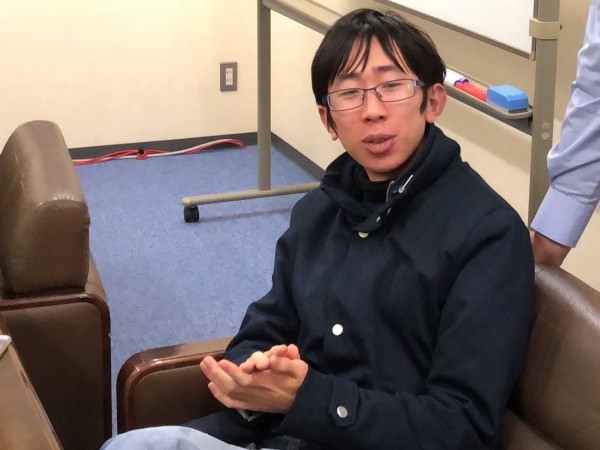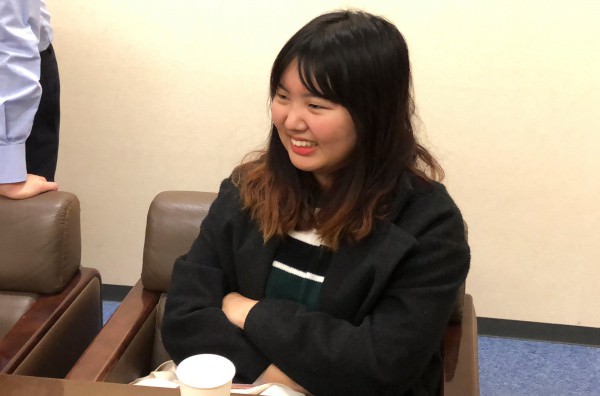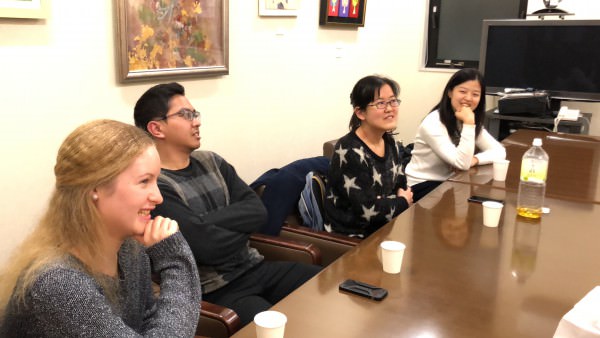Mahasiswa Asing di Kyoto bercerita tentang Culture Shock yang dirasakan di Jepang
2018.03.13
Penggunaan Wasei-Eigo dan Katakana
Preng Fei:Di Jepang banyak sekali kosakata dengan huruf Katakana. Kosakata yang bisa diekspresikan dengan Bahasa Jepang pun banyak ditulis dengan huruf Katakana. Banyak dari kosakata-kosakata itu yang saya gak begitu mengerti artinya.
Mook:Sering tidak bisa dibedakan ya apakah itu kosakata Bahasa Inggris yang ditulis dengan huruf Katakana, atau memang cuma Wasei-Eigo (kosakata Bahasa Inggris buatan Jepang).
Katrina:Iya, sih ya. Banyak juga kosakata yang beda banget artinya dengan Bahasa Inggris. Misalnya kata Mansion dalam Bahasa Inggris itu artinya perumahan untuk orang kaya, gak seperti di Jepang yang apartemen biasa pun disebut mansion ya. Misalnya aku, kalau pulang ke Amerika dan bilang, “Aku tinggal di mansion, lho.” Kayanya orang-orang akan menyangka aku ini anak dari CEO perusahaan bonafit.
Cara buang sampah di Jepang
Mono:Saya kaget kenapa di Kyoto ini bersih sekali bahkan gak ada satu kaleng pun yang jatuh di jalan. Hal ini sih yang paling ingin saya bawa pulang ke tanah air.
Hyejin:Karena klasifikasi sampah di Kyoto itu ketat, ya.
Katrina:Aku bahkan sampai langsung tahu kalau itu siswa baru datang sewaktu melihat mereka berdiri kebingungan di depan tempat sampah yang berbeda jenisnya. Sebelum membuang sesuatu, mereka berdiri di depan semua tempat sampah dan melihat labelnya. Ada tempat sampah untuk kertas, tempat sampah untuk plastik, tempat sampah untuk yang bisa dibakar, misalnya mau membuang wadah plastik dengan penutup kertas, siswa baru pasti selalu bingung ya.
Mono:Agak syok juga sih ya sewaktu dimarahi karena semua jenis sampah dibuang sekaligus bebarengan, atau saat salah hari pengumpulannya.
Katrina:Setelah mendengar masalah klasifikasi sampah dari siswa lain, aku jadi lebih hati-hati buang sampah. Kalau kita gak mengerti cara buang sampah yang benar, sampah di rumah jadi menumpuk, ya. Aku sering lihat banyak sampah menumpuk di apartemen mahasiswa asing, karena mereka gak mengerti harus gimana. Kebingungan yang sering terjadi, ya. Hahaha
Mook:Saya juga di rumah sekarang ada 4 kantong, Hahaha
Di Jepang agak sulit saat hendak membuang furnitur atau alat elektronik. Kita harus memanggil perusahaan pengumpul sampah yang berbayar.
Mono:Sewaktu saya buang sampah berukuran besar seperti barang elektronik dan furnitur, saya meminta perusahaan pengumpul sampah untuk datang dan mengambilnya. Saya bersyukur sih, tapi saya bingung juga kenapa harus bayar.
Perbedaan Televisi
Mono:Program TV Jepang tulisannya besar-besar, ya. Tampilan acara TV Jepang mengganggu banget. Karena ada tulisannya dimana-mana.
Katrina:Gaya iklan komersial di TVnya juga beda banget dengan di Amerika. Iklan Jepang itu lucu. Aku selalu berpikir kenapa barang ini dijual dengan iklan begitu? Hahaha benar-benar beda dari iklan di TV Amerika.
Hyejin:Menurutku iklan Jepang itu jumlah informasinya banyak, ya. Narasinya banyak, jadi banyak informasi yang tersampaikan sekaligus. Di Korea banyak sekali iklan yang mengekspresikan image secara keseluruhan.
Ye Eun:Lalu, kita baru akan mengertiitu iklan apa setelah menontonnya sampai selesai. Karena tidak ada narasinya, ya.
Saat pergi minum di Jepang
Katrina : Di Amerika, setelah kita pergi minum bareng, rasanya tuh semua jadi lebih akrab dari sebelumnya. Tapi di Jepang sehari setelah pesta minum kayanya seperti gak ada apa-apa gitu. Seolah yang, “Oh iya, yaa” gitu aja, Hahaha
(Di sini semua mahasiswa asing mengangguk setuju)
Mono:Hahaha sering banget, ya!
Mook:Pada hari kedua saya datang ke Jepang, kami mengadakan pesta minum. Seru sekali dan semua orang bersenang-senang. Jadi saya berpikir, “Menyenangkan sekali mereka semua!” Tapi besoknya, semua orang jadi pendiam banget. Dua minggu kemudian, semua orang masih pendiam. Hahaha
Katrina:Setelah aku tahu bahwa semua orang akan kembali ke kehidupan normal sehari-hari keesokan harinya, aku mulai berpikir bahwa pesta minum bukanlah tempat untuk saling mengenal.
(Mungkin, setelah kita keluar bareng berkali-kali barulah kita benar-benar bisa mengenal satu sama lain, ya.)
Mono:Bisa pergi minum berkali-kali juga mungkin karena harga alkohol di Jepang gak mahal.
Mook:Memang sih, di Thailand gak ada yang namanya Nomihodai. (Nomihodai adalah layanan menu di mana kita bisa memesan minuman sepuasnya dalam batasan waktu dengan membayar harga tertentu.)
Mono:Harganya juga cukup murah, dan gak terlalu ada batasan untuk pergi minum, ya. Beda dengan Jepang, di New York kita gak boleh minum alkohol di taman ya.
Ye Eun:Saya gak tahu sih kalo alkohol lebih murah di Jepang atau gak, tapi yang pasti kalau pakaian di sini jauh lebih mahal daripada di Korea. Kalau jadi mahal karena aksesoris yang berlebihan, saya sih mendingan yang simple saja, hahaha
Perbedaan Fashion
Mook:Ngomong-ngomong soal pakaian, saya takjub dengan pakaian Perempuan di Jepang. Saat musim dingin semua memakai rok pendek. Saat musim panas kebalikannya, mereka pakai rok yang Panjang. Ada yang berpikiran sama gak? Saya pikir saat musim dingin itu pakai rok panjang akan jadi hangat sih, ya. Kenapa justru saat musim panas mereka pakai rok dan baju lengan panjang?
※Ketika ada yang berpendapat bahwa banyak perempuan di Jepang yang tidak mau kulitnya terpapar sinar matahari makanya mereka berpakaian seperti itu, semuanya tertawa dan setuju.
Mono:Oh, begitu yaa! Saya mengerti sekarang!
Ye Eun:Saya juga berpikir begitu sih, kenapa di hari sepanas itu mereka berpakaian begitu..
Ketika para siswa ditanya apakah sebagian besar orang di negara mereka tidak terlalu peduli dengan sinar matahari yang mencokelatkan kulit, beberapa siswa menjawab bahwa mereka peduli hanya sampai batas tertentu. Beberapa orang lainnya mengatakan kalau mereka akan berpakaian sesuai dengan iklim.
Katrina kemudian bercerita tentang budaya Amerika yang berkaitan tentang mencokelatkan kulit dengan berjemur sinar matahari.
Katrina:Di Amerika banyak orang yang ingin mencokelatkan kulitnya. Di sana, kalau dibilang kulit kita kecoklatan itu artinya kita dipuji. Di Jepang kalau dibilang “Kamu putih ya!” itu kalimat pujian, tapi di Amerika kalau dibilang begitu tandanya orang berpikir kamu sedang tidak sehat. Waktu kecil aku sering dimarahi, “Kamu itu terlalu putih! Sana main di luar!” begitu.
Setelah datang ke Jepang, orang-orang melihat kulitku dan memuji dengan bilang kalau aku punya kulit yang putih, aku bersyukur sih untuk itu. Tapi kayanya sebelum pulang ke Amerika aku perlu berjemur dulu, deh! Hahaha
Culture shock itu tidak bisa dihindari, tapi dengan kita mendengar cerita dari mahasiswa asing lainnya tentu culture shock ini rasanya akan lebih ringan.














